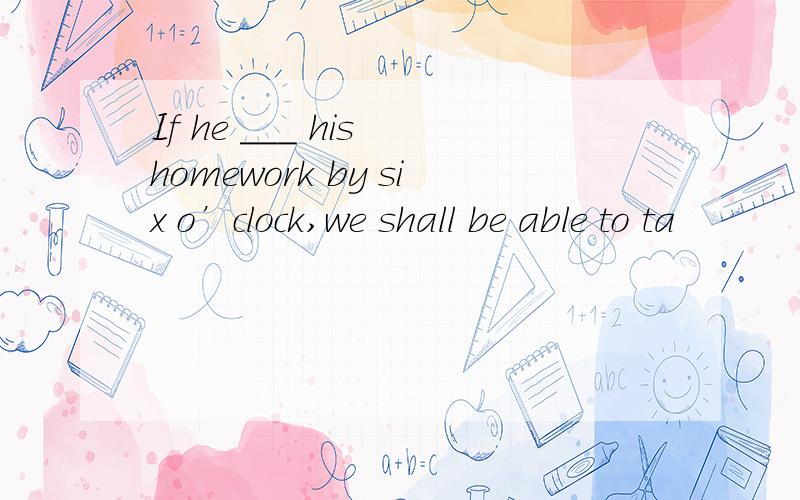If he ___ his homework by six o’clock,we shall be able to ta
来源:学生作业帮 编辑:神马作文网作业帮 分类:英语作业 时间:2024/11/06 08:42:36
If he ___ his homework by six o’clock,we shall be able to take him with us.
A.finished B.had finished C.has finished D.will finished
为什么选C
为什么不用finishes呢?区别是什么?而且finish是非延续性的动词,一般不用完成式。它的完成式有什么语法含义?
A.finished B.had finished C.has finished D.will finished
为什么选C
为什么不用finishes呢?区别是什么?而且finish是非延续性的动词,一般不用完成式。它的完成式有什么语法含义?

首先,非延续性动词是可以用于完成时态的.只是非延续性动词在肯定句中不能与表示一段时间的状语连用,如I have finished my homework for two days这个句子是错误的,但去掉two days是可以的.否定句中非延续性动词能与表示一段时间的状语连用,如 she hasn't taken part in labour for weeks.
第二,条件状语从句中,谓语的时态可以用一般现在时或现在完成时代替将来时,但原题似乎强调homework的完成,所以用完成时态较好.
在after,as soon as,if ,till,when等引导的状语从句中,用现在完成时态代替将来时.如 I shall go to see you when I have finished my homework.
可参考徐广联主编中的时态那一讲.
至于楼主问的finishes是否正确?按理说可以.如1998年1月四级考试中曾有一题,用了finishes:
35.______ he works hard,I don't mind when he finishes the experiment.
A) As soon as B) As well as C) So far as D) So long as
所以finishes按理说是可以接受的,但楼主给出的题目中没有此选项.不过,个人觉得原题目用现在完成时比一般现在时好.
第二,条件状语从句中,谓语的时态可以用一般现在时或现在完成时代替将来时,但原题似乎强调homework的完成,所以用完成时态较好.
在after,as soon as,if ,till,when等引导的状语从句中,用现在完成时态代替将来时.如 I shall go to see you when I have finished my homework.
可参考徐广联主编中的时态那一讲.
至于楼主问的finishes是否正确?按理说可以.如1998年1月四级考试中曾有一题,用了finishes:
35.______ he works hard,I don't mind when he finishes the experiment.
A) As soon as B) As well as C) So far as D) So long as
所以finishes按理说是可以接受的,但楼主给出的题目中没有此选项.不过,个人觉得原题目用现在完成时比一般现在时好.
We'll start at six o'clock if it ___ raining by then.
Shall we go to cinema ( ) six o"clock ( )the evening
He does his homework at about six o'clock.(改成否定句)
He does his homework at about six o'clock.(改成否定句)
Daniel does his homework at six o'clock
His brother will be able to driver himself soon.Now he is ta
he has to be ____ bed ___ nine o'clock A、at;at B、to;by C、in;
If he __(be)here before 10 o'clock,I shall see him.
We may have some difficulties _____ by six o’clock.
He has to get up at six o'clock对at six o'clock提问
he must be home before six o'clock
shall we meet at six o'clock?we had better a little later.le